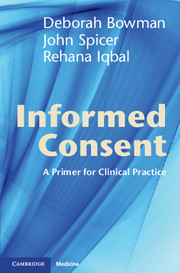Chapter 1 - Introduction to clinical consent
laying out the territory
Published online by Cambridge University Press: 05 January 2012
Summary
Introducing consent
The process of seeking the consent of a patient to a medical procedure is, arguably, one of the most important skills a doctor, or indeed any clinician, should learn. In fact, the very idea that doctors may institute diagnostic or treatment processes of any sort without a patient’s consent is utterly counter-intuitive to the modern practice of medicine.
It was not always thus, and even now it can be reliably assumed that consent is still not sought and gained appropriately in every clinical encounter. To say that it should be sought and gained in this manner elevates the value of consent to a high level. It can be instructive to ask oneself why such a value might be held to be the case. The answer to this question lies in the philosophical underpinning of clinical consent, which sits within a notion of personal autonomy, and respect for autonomous decision-making. When we say that autonomous decision-making should be respected, we are endowing individuals with the ability to make their own decisions about their individual futures. It is a philosophical axiom that this should be so, with a long history attached.
Information
- Type
- Chapter
- Information
- Informed ConsentA Primer for Clinical Practice, pp. 1 - 10Publisher: Cambridge University PressPrint publication year: 2011
